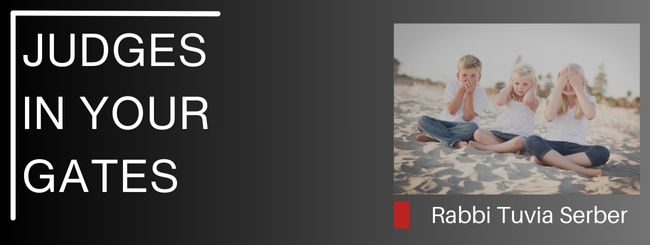This week’s Torah reading starts with a commandment regarding Judges and Policemen. Even though the Mitzvah might not apply in a physical sense, it still applies spiritually. What’s the meaning?
This week’s Torah reading is called Shoftim, which means judges. The Torah is talking about appointing judges and officers in every city to ensure justice. Historically, the elders, the wise people, the judges would sit at the gates of each city. Anyone with a problem requiring justice would go to the city’s gates, speak to them, and resolve their issues.
However, justice doesn’t work like that anymore. Every country now has its own justice system. So, although the physical commandment no longer applies, meaning we don’t need to place people at the gates of every city (and most cities don’t even have gates), the spiritual aspect of the commandment still applies.
The idea is this: each of us has many “gates,” metaphorically speaking. What does that mean? The gates of the body are your eyes, ears, mouth, and so on, where information enters and exits your system. The Torah teaches us something interesting here. In Hebrew, it says, “You shall appoint judges and officers in all your gates.” The Torah is talking about cities, but it could have used another word, like “your cities.” Why does it say “gates”? Because it’s referring to your personal gates in a spiritual sense.
You should place judges over your eyes, your ears, your mouth, your mind—to control what comes into your system and what goes out. In simple terms, there are things you shouldn’t see, things you shouldn’t hear, like lashon hara (gossip). There are things you shouldn’t say. On the positive side, you should look at each person in a positive way, judge them favorably. You shouldn’t listen to gossip, but rather words of Torah. You should speak words of prayer, Torah learning, and not things that have nothing to do with serving G-d.
The way to achieve this is through “judges.” You must learn and understand what behavior G-d expects from each of us, regardless of who you are, where you live, or when you live. The Torah is eternal, and its teachings are eternal. This means you must place judges to monitor what you hear, what you say, and so on. You should hear words of Torah, etc.
One more step: The Torah continues to say that through these judges, you will eliminate the bad within yourself. As you read on in this week’s portion, it says this will eliminate the bad within the Jewish people. And if you go one step further, it will eradicate evil from the entire world.
So, by placing judges over your personal gates—your eyes, ears, mouth, etc.—you eliminate the bad within yourself. This impacts the entire Jewish people: each person eliminates the bad within themselves, and thus within the whole Jewish nation. This, in turn, impacts the entire world.
Going a step further: not only should the Jewish people be careful about what they hear, see, and say, but this concept also applies to all of humanity. There are certain behaviors that, although the specific commandment applies only to Jews (to appoint judges and officers in their cities), the lesson applies to every human being. Are we to say that G-d only cares when a Jew speaks ill of someone, but when a non-Jew does, it doesn’t matter? No. There is specific behavior connected to serving G-d. In this case, it’s about not speaking ill of others, not listening to gossip, etc. This behavior, whether or not it’s a mitzvah, applies to everyone.
So what does the Torah tell us? Appoint judges, as it used to be. We will return to this quickly with the coming of the Messiah. In the meantime, you must do something to bring the Messiah. Don’t just sit and wait for G-d to bring the Messiah. You need to act. In this case, what must you do? Appoint judges over all your “gates.”
Parshat Talk from Rabbi Tuvia Serber
The above is a representation of the spoken text converted to written text.
© Copyright, all rights reserved. If you enjoyed this article, we encourage you to distribute it further.
Our blogs may contain text/quotes/references/links that include copyright material of Mechon-Mamre.org, Aish.com, Sefaria.org, Chabad.org, and/or AskNoah.org, which we use in accordance with their policies.
